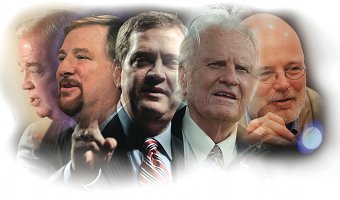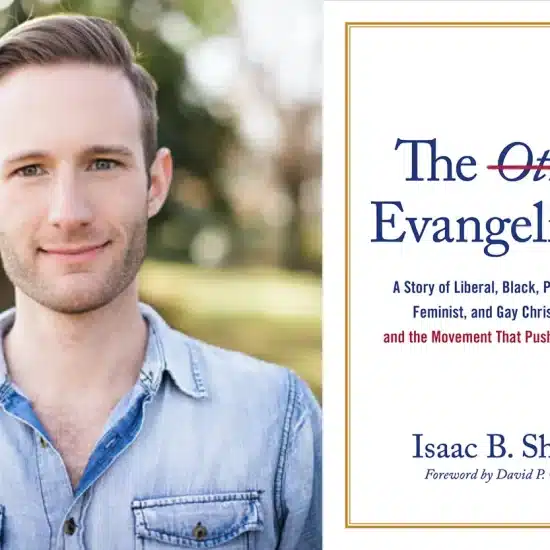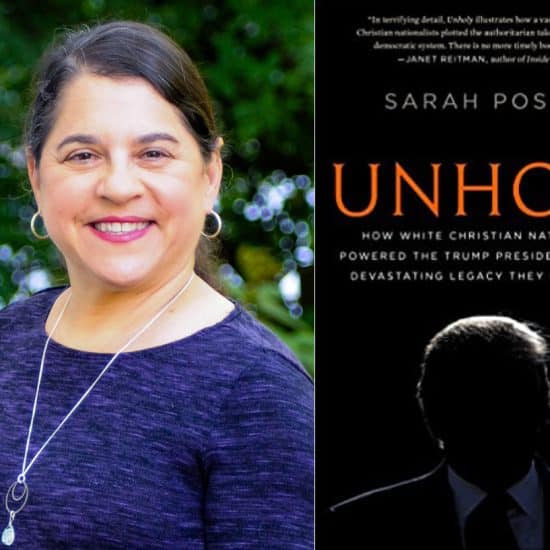When evangelist Billy Graham, social activist Jim Wallis, pastor Rick Warren, theologian Al Mohler and author Brian McLaren all can fit under the umbrella term “evangelical,” some theological and cultural observers wonder if the term has lost its meaning.
 |
And at the same time, some Baptists who either continue to identify themselves as Southern Baptist or grew up in that tradition question whether the label fits them.
On the right, some Southern Baptists have embraced engagement with evangelicals in conservative Christian political concerns, but they question how long their denomination can maintain fellowship with a movement with such broad parameters.
“Southern Baptists and other evangelical groups may be ships passing in the night,” wrote Steve Lemke, provost of New Orleans Baptist Theological Seminary, in a paper on “The Future of Southern Baptists as Evangelicals,” delivered in 2005 at a Mid-America Baptist Theological Seminary conference. “Many evangelical institutions seem to be shifting to the left, while Southern Baptists have made a sharp course correction to the right.”
On the other hand, some Baptists who hold to strict separation of church and state have shied away from the term “evangelical” because they believe it has be co-opted by the Religious Right. That tendency could be seen early in a 1976 Newsweek magazine cover story, “Born Again! The Year of the Evangelicals.” In it, a noted Southern Baptist ethicist and agency head emphatically sought to distance himself and his denomination from the growing movement.
“We are not evangelicals. That’s a Yankee word,” the late Foy Valentine, then executive director of the Southern Baptist Convention’s Christian Life Commission, told religion reporter Kenneth Woodard. “They want to claim us because we are big and successful and growing every year.
“But we have our own traditions, our own hymns and more students in our seminaries than they have in all of theirs put together. We don’t share their politics or their fussy fundamentalism, and we don’t want to get involved in their theological witch hunts.”
But things changed in the intervening 34 years. Decades of bitter denominational controversy transformed the landscape.
• A survey conducted by LifeWay Research for Outreach magazine recently named the largest and fastest growing churches in the nation. While some of the top five in each category have Baptist roots, only one—Second Baptist in Houston, the country’s third-largest congregation—has the word “Baptist” in its name.
• Many Baptist churches sing the same praise and worship choruses as independent evangelical congregations.
• Denominational gatherings generally pale in attendance compared to conferences sponsored by networks of evangelical megachurches.
• And the six seminaries supported by the Southern Baptist Convention no longer have a virtual monopoly on educating the next generation of ministers.
“Looking at theological education, when I began teaching, the Association of Theological Schools was dominated by the Ivy League schools and by the mainline denominational seminaries. Today, ATS is dominated by the evangelical schools. Nearly all the largest seminaries are evangelical. It’s a different ballgame,” said James Leo Garrett, distinguished professor emeritus at Southwestern Baptist Theological Seminary and author of Baptist Theology: A Four-Century Study.
A 1983 book by Garrett and Glenn Hinson sought to answer the question, “Are Southern Baptists Evangelicals?”
Hinson took the position that Southern Baptists and evangelicals shared some common ground, rooted in the Protestant Reformation. But he insisted Baptists in general—and Southern Baptists in particular—placed priority on the experience of voluntary, uncoerced faith. Evangelicals, on the other hand, emphasized objective, propositional truth as they believed it be revealed in Scripture.
Garrett, in contrast, classified Southern Baptists as “denominational evangelicals.” He noted they shared with evangelicals in general a commitment to the authority of Scripture, Christ-centered doctrine, gospel proclamation, the experience of grace and the imperative of evangelistic and missions endeavors.
Garrett believes events in the years since his and Hinson’s book have validated his position.
“Fewer Baptists today would utterly deny that Southern Baptists are evangelical,” he said.
As far as his designation of Southern Baptists as “denominational” evangelicals, Garrett said if many Southern Baptists today look more generically evangelical than distinctively Baptist, he cites two causes—failure to teach distinctive Baptist principles and fallout from denominational in-fighting.
“One of the greatest causes of dropping Baptist identity has been 30 years of controversy,” he observed.
But while some Baptists have discarded their own de-nominational label, others have shied away from the term “evangelical” because of the political baggage it carries.
Theologian William Brackney regrets that tendency. In an article for EthicsDaily.com, he emphasized his belief that the evangelical label is among those “terms above being hijacked for special purposes.”
“I use it in a particular way—to denote any professing Christian who defines faith in the context of Scripture, who understands Jesus Christ as a unique union of God and humanity, and who holds to the necessity of conversion and vital Christian experience and witness,” wrote Brackney, professor of Christian theology and ethics at Acadia University and Acadia Divinity College in Nova Scotia.
“I happen to believe that ‘evangelical’ legitimately applies to groups or persons in Protestant, Catholic and Orthodox categories, regardless of race, gender, lifestyle or socio-economic status.”
Although Brackney says he uses the term to describe “gospel-friendly people of many different stripes,” he acknowledges some use to it describe a particular social, political and cultural viewpoint rather than a doctrinal commitment.
“A whole new phenomenon has arisen in political evangelicalism that is identified with anti-abortion, opposition to same-sex unions, anti-big government, anti-socialism, anti-Islam racial profiling, as well as pro-individualism, pro-capitalism and various degrees of neo-nationalism,” he wrote.
But, Brackney and Garrett agreed, whatever its shortcomings, the evangelical label finds its grounding in Scripture. For a people who emphasize the authority of the Bible, it’s difficult to argue with that.
“It’s rooted in the good news of the gospel,” Garrett said. “It’s hard to make an argument for a better term.”






